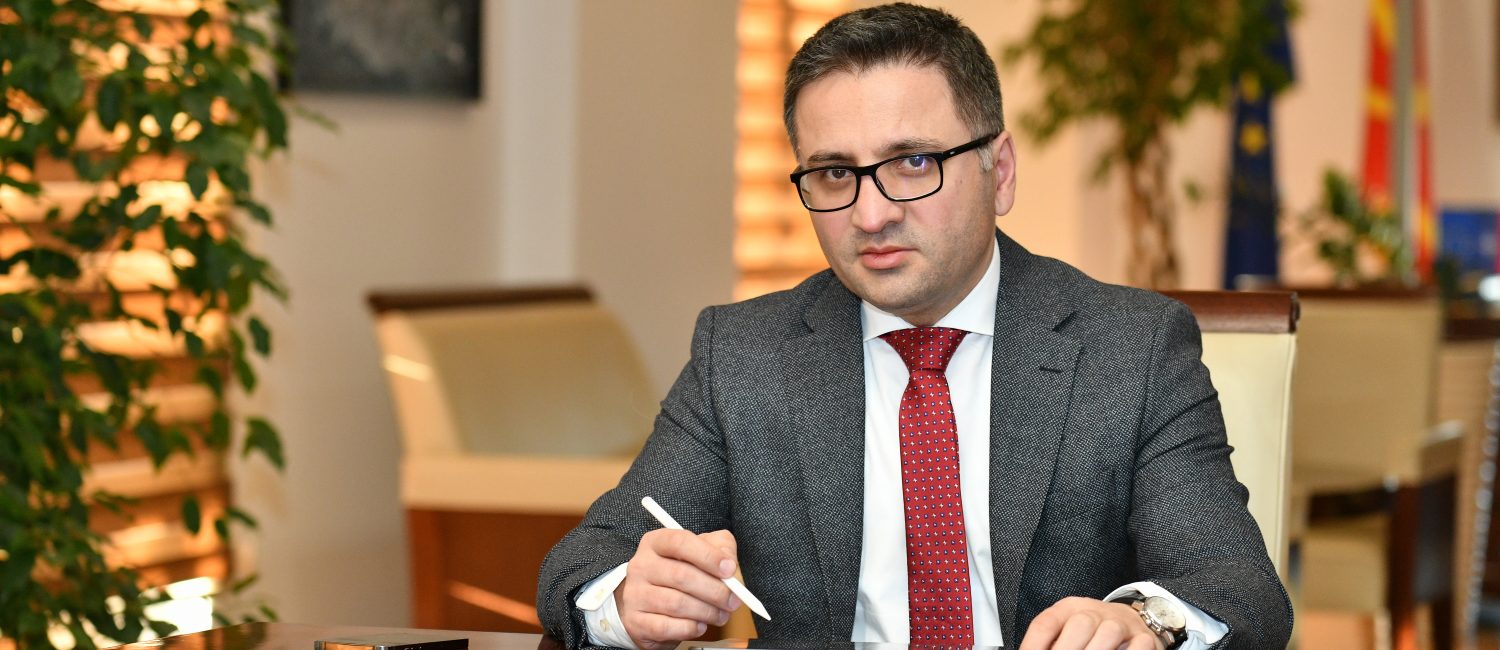More than 30 measures totaling over EUR 600 million have been adopted since the outset of the energy crisis aimed at protecting both the households and the economy
13th March 2022, Skopje – It has been two turbulent weeks from the dark 24th February, when Russia launched invasion of Ukraine. Unprecedented blow to humanity, considering the thousands of human lives lost and family tragedies. Severe blow to global economy and the living standard of the million of citizens worldwide. Why is the world population affected? Because the crisis in Ukraine is not just a war between two countries, but it is rather a war between two very critical links in the global supply chains. Russia is the largest natural gas exporter, second-biggest exporter of crude oil, major exporter of metals, while together with Ukraine, they are one of the major wheat suppliers globally.

In the course of these two weeks, the ruble reached the trough, the price of barrel of oil sky-rocketed (it exceeded US$ 130 per barrel for the first time since 2008), and the international community imposed sanctions for an economic isolation of Russia. It has become obvious that the crisis in Ukraine will affect the global economy. IMF have already announced downward revision of the annual economic growth forecast, following its reduction by 0.5 p.p. in January to 4.4%. European Central Bank have already cut their forecasts for the economic growth in the Eurozone to 3.7% from 4.2%, which is somehow a positive thing, since for the time being the European economy is not expected to enter any new recession (which is also good news for us, considering the dependence of the national on the EU economy). ECB raised its projections for inflation in the Eurozone up from a forecast of 3.2% in December last year to 5.1%. They project inflation to drop to 2.1 % in 2023, reaching slightly below 2%, i.e. 1.9%, in 2024.
Policy makers have encountered the biggest challenge – the situation in Ukraine has led the price pressures of commodities on global stock markets to at all-time highs. Price pressures began in 2021, commonly known as energy crisis. At the onset of the pandemic in 2019-2020, energy demand sharply plunged and, as a result, oil production accordingly declined. When the economies resumed functioning in the “new normal” context, producers were slow in responding to demand recovery. At the same time, many local developments occurred in the light of the energy crisis. For instance, at the end of 2020, China completely blocked coal imports from Australia. Brazil, relying on hydropower for two-thirds of its electricity, experienced the worst drought in a century. Furthermore, efforts are also put for green energy and reduction of CO2 emissions in the European Union. Just one-fifth of the higher power costs could be attributed to the efforts to reduce CO2 emissions, Executive Vice President Frans Timmermans pointed out.
Soaring power prices on the global stock exchanges, including the prices of other commodities, have built up overall price pressures which rippled through the international markets in the national economies. Culmination of the Russian-Ukrainian crisis has now driven these pressures even higher.
First measures adopted in the summer of 2021
As a small and open, our economy, like most of the economies worldwide, was affected by the developments on the international markets of commodities (energy and food). As the crisis advanced, such developments were felt less in the course of 2021, intensifying at the end of the year and reaching their peak at the beginning of 2022. Although some may say, probably politically driven, that we are late in adopting the first measures, if truth be told, the Government adopted the first measures more than six months ago, by reducing VAT on electricity. Under the modifications and amendments to the VAT Law, tax rate on supply of electricity to households was reduced from 18% to 5% in July last year, to be applied by June 2022. By introducing preferential tax rate, we have shielded the citizens from the initial impact of energy price increase. Furthermore, in order to cushion electricity and heating price hike, the Government transferred Denar 5.3 billion on two occasions (end-2021 and beginning of 2022), or total of around Denar 10.6 billion, to Power Plants of North Macedonia. It resulted in lesser electricity and heating price adjustment in relation to the real market value, i.e. the price accounts for around 20% relative to the market one.
Moreover, prices of part of commodities were frozen in December and, following the expiry of this measure, new measure was adopted to set margin cap on these commodities.
In the light of protecting the living standard of the citizens, minimum wage of pensioners was increased, all to the end of protecting the citizens with income lower than the average.
Now, two weeks into the Russian-Ukrainian crisis, we have adopted a set of 26 measures providing for protecting the standard of the citizens and supporting the economy. New set of measures is worth around EUR 400 million. If one takes into account the measures the Government implemented last year and at the beginning of this year, the amount allocated so far to cushion the price shocks for the citizens is around EUR 615 million. This amount is close to the amount the Croatian Government has projected to manage the price pressures, around EUR 635 million. For comparison purposes, Greece has projected EUR 500 million, Slovenia and Albania have projected around EUR 200 million each, etc.
If compared to the countries in the region, at the moment, prices of commodities, such as cooking oil, sugar, flour and fuels, are the lowest in our country. For instance, price of diesel is around EUR 0.3 per litre, or around Denar 18 cheaper compared to Serbia, Croatia and Montenegro. Price of cooking oil is EUR 1.5 per litre in our country, ranging from EUR 1.7 in Serbia, EUR 1.76 in Bosnia and Herzegovina, EUR 1.77 in Kosovo, EUR 1.89 in Montenegro to EUR 2.2 in Croatia. Flour and sugar price per kilogram in our country, compared to the region, is up to 20 euro cents lower.
My intention is not for the reader to misunderstand these comparisons. No one is trying to console anyone that our neighbors pay higher prices. We are conducting an economic analysis of the developments so that we can get the whole picture of the situation. To that end, I will revisit the sets of measures they, as well as the other EU Member States, are implementing and planning, since the pressures are felt everywhere, and they accordingly come up with activities and measures.
What measures have our neigbouring countries and EU Member States undertaken?
If one analyzes the measures planned to be implemented and those that are being implemented in the countries in the region and the EU Member States, they can be categorized in transfers to vulnerable categories, reduction of taxes on energy products and regulation of the retail prices.
Hence, set of measures in Croatia, the implementation of which is expected to provide for reduction of the inflationary pressures in the second half of the year, comprises measures aimed at reducing VAT rate and direct financial support. The measures envisage reduction of VAT on gas from 25% to 13% (to 5% the first year), VAT on firewood is cut to 13%, VAT on commodities, such as fresh meat and fish, fruit, vegetables, cooking oil and baby foods, is reduced to 5%, as is VAT on bread and milk. 5% VAT will also apply on hygiene products and tickets for sports and culture events. Direct financial support is envisaged as well for the most vulnerable categories, such as social assistance beneficiaries and pensioners, as well as entrepreneurs and farmers.
Slovenian measures are aimed at targeted financial transfers, which also envisage support to pensioners, social assistance beneficiaries, disability and child allowance beneficiaries, multi-child families and foster parents. The measures also include three-month suspension for all households of the surcharge used to support renewable energy producers and high-efficiency combined generation, as well as distribution and transmission network fees.
Serbia has adopted measures aimed at improving energy efficiency through financial support for the households. In order to reduce inflation, Serbia has introduced measure to freeze prices of flour, sugar, sunflower oil, pork and milk, as well as to ban export of certain commodities.
Montenegro has recently adopted measures for reduction of excise duties on fuel by 20% and one-off assistance in the amount of EUR 50 for pensioners receiving below-the-average pension. They have also adopted decision on increasing the commodity reserves – food and fuel, as well as a decision on establishing commodity reserves, considering that Montenegro has no commodity reserves since 2003.
Greece, Bulgaria and Albania have introduced models for subsidizing the electricity prices for households and businesses, while Kosovo has introduced 2-hour electricity outage daily amid a jump consumption, low domestic generation, high prices of import and disruptions caused by imbalance in the European transmission network.
EU Member States have introduced similar measures. Germany has announced reduction of surcharge on electricity bills, also preparing measures to help vulnerable households fully cover their heating bills. They also envisage one-time grants for low-income households, which are to be paid over the summer, when the households receive their bills from energy suppliers.
26 measures pertaining to prices of food, fuel, support to vulnerable categories and businesses
When our Government designed the set of 26 anti-crisis measures, aimed at protecting the citizens’ standard, experience of other EU Member States and the countries in the region was taken into account. Nevertheless, the measures are designed in line with the needs of our economy and the citizens.
If the most recent set of measures is analyzed, they can be grouped in several categories. According to their type, we have envisaged tax measures, financial support, administrative restrictions to prices and energy saving measures. If grouped according to their effect, they provide for cushioning the increase of prices of food and fuel, greater energy efficiency and support to companies.
With respect to the measures aimed at reducing the food prices, VAT preferential rate on commodities has been reduced from 5% to 0%. This measure also applies to commodities such as bread, sugar, flour, sunflower cooking oil, long-life milk, fresh meat, rice and eggs.
For the purpose of intensifying the effect of this measure, it will be implemented in parallel with the setting margin cap on some commodities. Hence, in the period April-June 2022, it is envisaged to freeze the margin all to the end of preventing excessive profit in times of energy crisis and higher inflation rate, when food prices are susceptible to frequent upward adjustments.
The set of measures also includes temporary measure exempting customs duties on import of commodities and raw materials, such as wheat, flour Type 400 and sunflower cooking oil.
Vouchers in the amount of Denar 1,000 are envisaged for the vulnerable categories each month in the period April-July, which are to be used for purchasing commodities. Starting with March pension ending with May pension, additional subsidies amounting Denar 1,000 are envisaged for all pensioners as pension bonus.
As regards prices of energy products, we have introduced several substantial tax cuts and tariff incentives. One of them is 5% VAT preferential rate on electricity for households to be applied by the end of the year. We have also recommended introduction of block tariffs – less quantity of electricity consumed to be charged with lower tariff, thus protecting lower-income households, as well as encouraging additional saving of electricity. Under the Energy Poverty Program, low-income households will have their monthly electricity bill reduced by Denar 600 or Denar 800 depending on their income. The Government will continue subsidizing the electricity price on the regulated market amid energy crisis in Europe and considerably increased electricity price on the stock market. Central heating price will also continue to be subsidized.
To the end of cushioning fuel prices, reaching the highest level for 14 years, we have reduced VAT rate from 18% to 10% on sale of unleaded fuel, gas oil, liquefied petroleum gas (LPG) and methane. The measure is expected to protect the purchasing power of the end consumers, including the small-scale farmers.
Excise duty on fuels has been also reduced accordingly as per the trends of stock market prices. Under the amendments to the Excise Law, excise duty will be reduced by Denar 1, Denar2 or Denar 4 per litre unleaded fuel, diesel and heating oil in line with the average daily stock market price at the “Mediterranean cargoes FOB (Italy)”.
As support to importers, they will be exempt from paying VAT at import of natural gas and electricity, heating energy or air-conditioning. This measure will have a positive effect on companies’ liquidity as regards the amount of tax they would have paid when importing.
As I have already mentioned, underscoring it here as well, these several days we have demonstrated how the institutions of the system act highly efficiently in the interest of the citizens. Following the announcement of the measures, Ministry of Finance submitted, through the Government, amendments to the VAT Law and the Excise Law to the Parliament. Last Friday, late at night, before midnight, the Parliament unanimously adopted the amendments, and the Government promptly adopted decision on implementing the respective tax exemptions. Energy Regulatory Commission, following the publication of both the Laws and the decisions in the “Official Gazette”, forthwith convened a session, setting the new prices of fuels, i.e. reducing the fuel prices by 7% to 9%. I am proud we have displayed a level of high efficiency in the interest of the citizens.
But, let’s get back to the set of anti-crisis measures. We have also envisaged many measures for increasing the energy efficiency. One of them is recommending the municipalities to reorganize public transportation, as well as to save and prudently consume electricity, since we rely on the actions of every single individual. All of us, the citizens, should understand that electricity price we pay is only 20% of the real market price thanks to the Government subsidies. When we are being irrational as consumers, we are being unreasonable about the state Budget, i.e. the citizens’ money.
We have also envisaged measures to support companies, such as the financial instrument through the European Bank for Reconstruction and Development providing access to financing for SMEs (as well as households) for investments in renewable energy and energy efficiency solutions. New credit line, through the commercial banks, is also envisaged aimed at supporting companies facing energy crisis and encouraging investments in renewable energy. Guarantee Fund is also available through the Development Bank as regards issuance of portfolio guarantees for micro-, small- and medium-sized companies and individual guarantees for large exporting companies through the portfolio guarantees.
We continue implementing the Fiscal Consolidation Strategy
Where do money for such a substantial set of measures come from? Around EUR 90 million out of EUR 400 million, the total amount of the set of measures, is foregone revenues, and EUR 310 million is direct spending. However, not all of the measure will be implemented at the same time. Some of them are short-term measures, such as tax relief and subsidies for vulnerable categories, while others are medium-term measures referring to the funds for support of the companies. Part of the funds will be provided from IFIs, such as EBRD. According to MoF calculations, economic effect of the measures is expected to exceed EUR 500 million, considering the multiplying effect of some of the measures and the Growth Acceleration Plan, according to which funds from the private sector are mobilized in addition to the budget funds.
Financial support to the citizens and the business sector is of crucial importance in economic turbulent times. Therefore, premature fiscal consolidation (withdrawing the financial support for the business sector and the vulnerable categories way too early) would delay the period of recovery, ultimately resulting in higher public debt as percentage of GDP. Hence, intergenerational solidarity and distribution of income and debt are open to debate. Budget will be supplemented in the course of the year, as is each year, reallocating certain funds, which are not going to be spent, to these respective positions.
Before I conclude this article, I would like to emphasize that even with the scenario of protracted crisis on the global energy and commodities market, fiscal space allows for additional intervention to protect the standard of the citizens and companies’ liquidity. However, what is especially important for all of us in times of crisis and high prices of commodities and energy products is that we can all contribute greatly by taking own steps if we save and proportionally consume energy products during this period, for the difference in prices to affect less on our income, regardless of whether it is a matter of income of an individual, a family or a business.
At the end I would like to add that no one says it is going to be easy, but I assure you as a Minister of Finance, and on behalf of my colleagues in the Government, we will fight for the citizens to feel the pressure from the Russian-Ukraine conflict as less as possible. We have actually proven it with the anti-crisis measures during the pandemic, which have significantly cushioned the impact on the economy, highly assessed by the international financial institutions. In the meantime, medium- and long-term macroeconomic and fiscal frame is well established, envisaging fiscal consolidation and accelerated growth, aimed at development of our economy.
Attentive monitoring, timely and proper response to the challenges in times of great deal of uncertainty and need to successfully manage the expectations
Despite the expected cushioning of the effects of the price and energy crisis with the measures undertaken by the Government, there is still great deal of uncertainty, making room for deliberations. We have difficult and accountable task in front of us – attentively monitoring the developments, continuous consultations and transparent communication, to retain the credibility of the institutions, thus avoiding the possible speculations so as to better manage the expectations, as a key determinant for favourable outcome of the socio-economic policies. It not a simple task in times of crisis, but rather a joint mission of all stakeholders of the society, policy makers, political parties, business community, experts and academia, the media, the civil society, simply put each and every citizen.
Fatmir Besimi, Minister of Finance
















